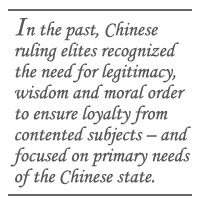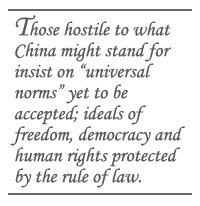China Rises Again – Part I
China Rises Again – Part I

SINGAPORE: China is getting ready for a fourth rise in its two millennia of history, but managing it may bring bigger challenges to its leaders than the past three delivered.
Overland relationships influenced the first three: The first followed imperial unification in the 3rd century BC, and the second saw a brief consolidation prompted by the threat of Turkic empires to vital trade routes in Central Asia during the 7th and 8th centuries; the third began defensively in the 14th century, but riding on the military might of the Manchu Qing dynasty, reached the peak of power in the 18th. Only with the latest, the fourth, are the economy-driven changes rapid and the challenges global. For the first time in its history, China is reaching across the waves and shooting for the stars. How will its leaders prepare the country for that exploratory ride?
Today, banks in the rich nations lose billions, and millions lose jobs everywhere else. No one can miss the effects of economic globalization. The new Chinese unemployed may hope that their condition is only temporary. But globalization is not temporary. China can now anticipate that its global future will be a series of pluses and minuses it must live with and plan for.

For at least the last three decades, the economic global was China’s major concern. Opening up to foreign direct investment and the benefits of an export-oriented economy transformed China into a manufacturing hub. Trade has become essential. Entrepreneurs now form a respected class, holding a place in society once reserved for its literati mandarins.
China has experienced long-distance trade for at least 2,000 years, a limited globalization that never challenged the nature of its civilization or the empire-state it had established. Throughout those centuries, the merchant and technically skilled classes remained marginal to the goals of security, stability and social harmony. Today, these classes have won more respect for their activities, but will some of them take center-place in the Chinese state and society?
In the past, Chinese ruling elites recognized that they needed legitimacy, wisdom and a moral order to ensure loyalty from contented subjects. They defended the state against their enemies, not by military strength alone but by instituting a system of inter-state tributary relationships that provided safety and prestige. By such means, the rulers limited their outreach and did not push towards the globalization that enveloped Eurasia. Their vision of the political global remained focused on the primary needs of the Chinese state.

This vision was finally shattered during the second half of the 19th century when new kinds of national empires became global Great Powers. After several military defeats, China saw that it had to accept the international system of nation-states in order to protect its sovereignty. But nothing could save the Manchu conquerors from the nationalism that the West aroused among a new generation of Chinese intellectuals.
The republic of 1912 marked the rise of a new nation-state based on the borders of the Qing Empire and the ideal of the oneness of a China that consisted of many ethnicities. Such a state could be protected as long as China had the capacity to keep its borders intact. But new competitive empires aggressively challenged those borders for nearly 40 years until the end of the Second World War.
After 1945, the victorious Americans and their allies devised a new political framework to regulate global power that was institutionalized in the United Nations Organization. The privileged seat in the organization given to China was denied to the Communist party that seized power in 1949. For 22 years until its admission in 1971, this China was outside that international system.
Since 1978, the People’s Republic has opened itself to the global economy and worked to become a status quo power in the UN system. As it becomes comfortable with that globalization, it now encounters a vital testing that confronts the international economy. How can China help repair the economic damage the world faces?

The Chinese have always prided themselves on being civilized as bearers of universal ideals. Since the early 20th century, they have struggled to learn and master the most progressive values they have found. They adopted the principles of science as the foundations of modernity. They accepted new standards of health, aesthetics, sport and lifestyle. But, in the realm of universal ideals, the revolutionaries who believed in “creative destruction” won the battle. In destroying much and failing to be creative, they thus lost the war. In an unprecedented reversal of policy, their leaders turned to what they saw as the universalist methods of modern industrial development.
Those hostile to what China might stand for are not satisfied. They insist on higher “universal norms” that China has yet to accept: ideals of individual freedom, democracy and human rights protected by the rule of law. Until the nation does so, critics see China’s dramatic economic achievements as measures to strengthen an authoritarian state capitalism that keeps the regime indefinitely in power.
The West expects further progress in China to conform to what’s considered appropriate for the global future. China’s sense of itself questions the validity of these Western demands. The Chinese leaders want to find their own selection of what they need for their multinational state to be prosperous, safe and civilized. They would like to do it in their own way and at their own speed.
This is now more possible than before. The depth of the present financial crisis has undermined the recently unchallenged confidence in the capacity of the West to provide answers to economic development. The turmoil in the Middle East confirms that military solutions to regime changes have had their day. And the string of failures in Africa is forcing international agencies to wonder if political and ideological pressures to induce reforms there are proving to be counter-productive.

A rising China cannot stop its advances into this inevitable globalization and must study these changes with care. As its leaders look for opportunities to move forward towards the next stage of growth, they see that the current global uncertainties have given them some time and space to re-examine their options. It is not surprising that the ongoing debates in policy and intellectual circles in China are sharply focused on how to shape the nation’s future in the midst of so much questioning and anxiety.
Given China’s history, both ancient and modern, the priorities are likely to be as follows:
The Chinese will continue to treat the economic global as means to a greater end and subordinate to what they consider their primary goal: a prosperous and powerful China that enjoyed respect and influence in the world.
They also see the need to redefine universalist values for China and accept whatever is necessary to sustain civilized living, and integrate modern ideas with the best of its own heritage.
However, for the long haul, Chinese leaders will concentrate on what they have always thought to be central to the idea of China: the security and stability of a unified state and a harmonious society, something that only good governance can ensure. To achieve that in the uncertain environment of potentially turbulent globalization where multiple interests and influences vie for preeminence is now their greatest challenge.
Wang Gungwu is one of the world’s leading authorities on Chinese studies and professor at the National University of Singapore.